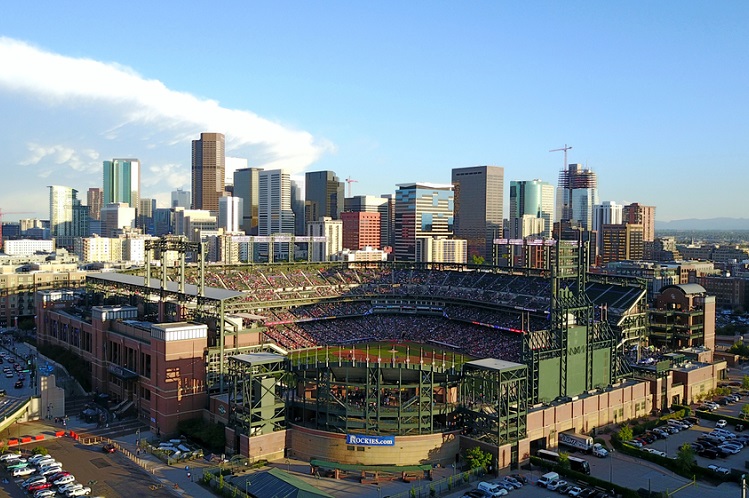Without sports, how do we even recognize our seasons?
SportsBiz: The economics of sports will change, and that will change the character of sports
Stewart Schley //July 15, 2020//


Without sports, how do we even recognize our seasons?
SportsBiz: The economics of sports will change, and that will change the character of sports
Stewart Schley //July 15, 2020//
Now and then a car passes by on Blake Street. Sometimes a bicyclist’s silhouette materializes behind the green screen of a temporary fence. But mostly it looks like a painting, this view of Coors Field. I’m not here, of course. I’m watching a live stream delivered by a webcam. Low in the frame there’s a rooftop patio with orange barstools tucked neatly underneath gray tables. But nobody’s there.
Damn, though, it’s a beautiful day for a ballgame. April 5, a Sunday. Rockies were supposed to be hosting San Diego. First pitch right about now. Might have been Gray or Freeland, who knows. It’d be interesting to see how Kyle’s looking, whether he’s rediscovered whatever it was that eluded him during a tortuous 2019 season. Great to get a first look at Nolan, too, doing Nolan things; bare-handing a shot down the line like he’s done a million times. And Blackmon, of course. Digging in at the plate, guy on second, that hushed moment just before the pitch.
Actually, forget all that. Right now I’d take a meaningless curveball in the top of the second. I’d happily settle for hearing a baseball smack a catcher’s mitt during warmups.
Like Joni Mitchell sang: Don’t it always seem to go.
The thing is the park looks great: sturdy and unaware. Lazy clouds with nowhere to go drift above the oversized clock that decorates the columned arch at the home plate entrance. The sun is diffused just enough to bathe these few city blocks in a midday copper gloss, a gentle come-hither glow.
Signposts from a world of sport we thought were immutable – March Madness drifting into Opening Day, the prime-time theater that is the NFL’s draft, the gallery ringing the 17th at Augusta – are gone. So are the crowds, the announcers, the buzz outside Pepsi Center as Avs fans file in.
The disappearance of sports is even more crushing than we thought. It’s not just about scoreboard: What has vanished are the steady beats of a life’s rhythm. If you’re a fan, your seasons aren’t so much winter and spring as they are NBA and MLB. A new year doesn’t start in January but in September, when your football team kicks off the regular season.
For now, that’s gone. And the unsettling thing is we don’t know when or how it comes back. Leagues are talking about cancelling seasons, or playing double-headers all summer to reclaim time, or hosting playoff games in empty stadiums. Or not playing at all. We’re in sports limbo. We presume stadiums will reopen and TV screens will flicker back to life and LoDo bartenders will again slosh beer into idled glasses. Except right now, we don’t know what that will look like. Will we return to our seats and reignite our allegiances? Are we still game to gather by the tens of thousands, shoulder to shoulder, ordering stadium food and high-fiving neighbors?
What we do know is that the economics of sports will change, and that will change the character of sports. Fans may be flummoxed by the idea of games played in empty stadia, but the reality of the industry is that media rights, much more than ticket and concession sales, pay the bills. Only $80 million of the $446 million in revenue vacuumed up by the Denver Broncos in the 2019 season came from gate receipts, according to the latest Forbes analysis. For the Rockies, ticket sales made up $78 million of a $291 million total. The inverse relationship holds for Colorado’s minor league teams, like Loveland’s Colorado Eagles, but for the big guys, one scenario is to keep the engines running on media rights alone, leaving the fans at home – and legions of ushers and food service workers out of jobs.
That would be weird and unwelcome, and not just because of the economic carnage. The idea that sports would devolve into a pattern of moving pixels on a glass screen is so impersonal as to be odious. What we want is to reclaim the ability to invest something of ourselves in the game. This is, after all, what sports do. Being a fan delivers us from the everyday, invites us to believe, serves up something that looks and feels a bit like religion. America is starved for that right now. For faith. For familiarity. For something to grab onto. Across Blake Street, on a Sunday afternoon, a perfectly fine ballpark sits empty, and that seems wrong. We want our opening day. We want it bad.

























